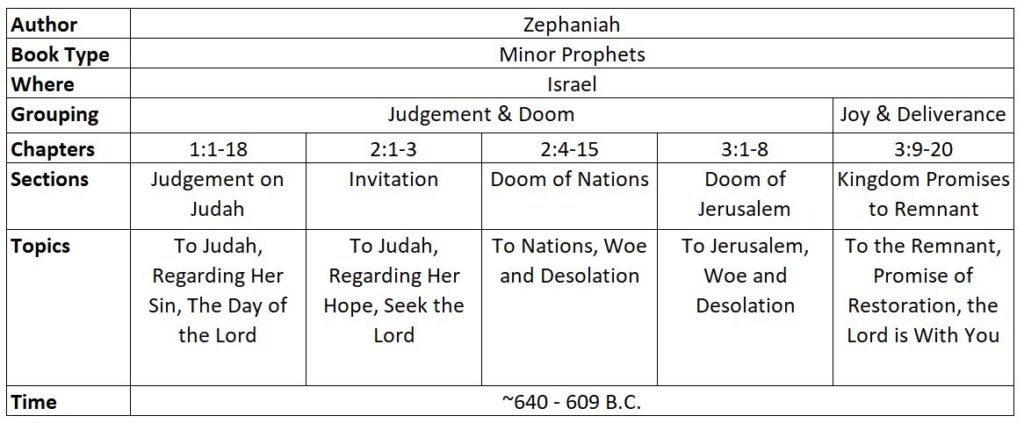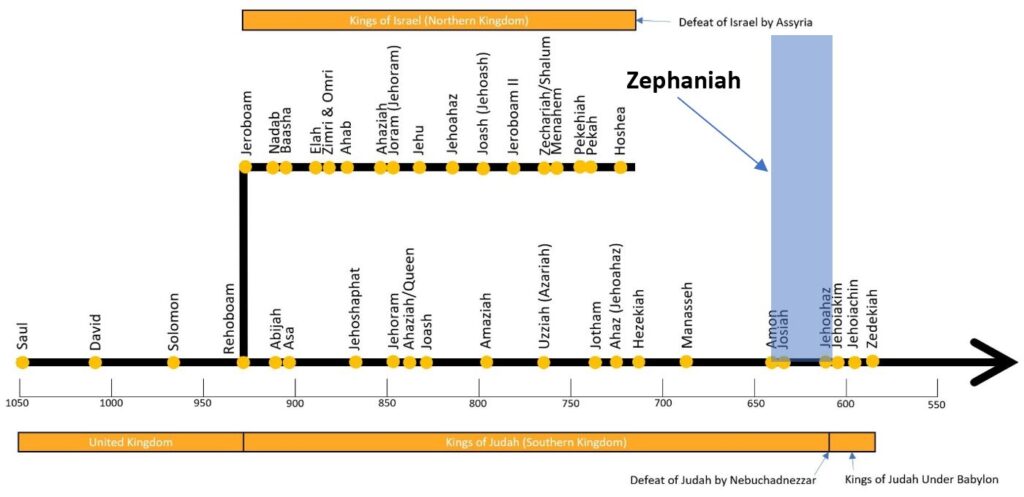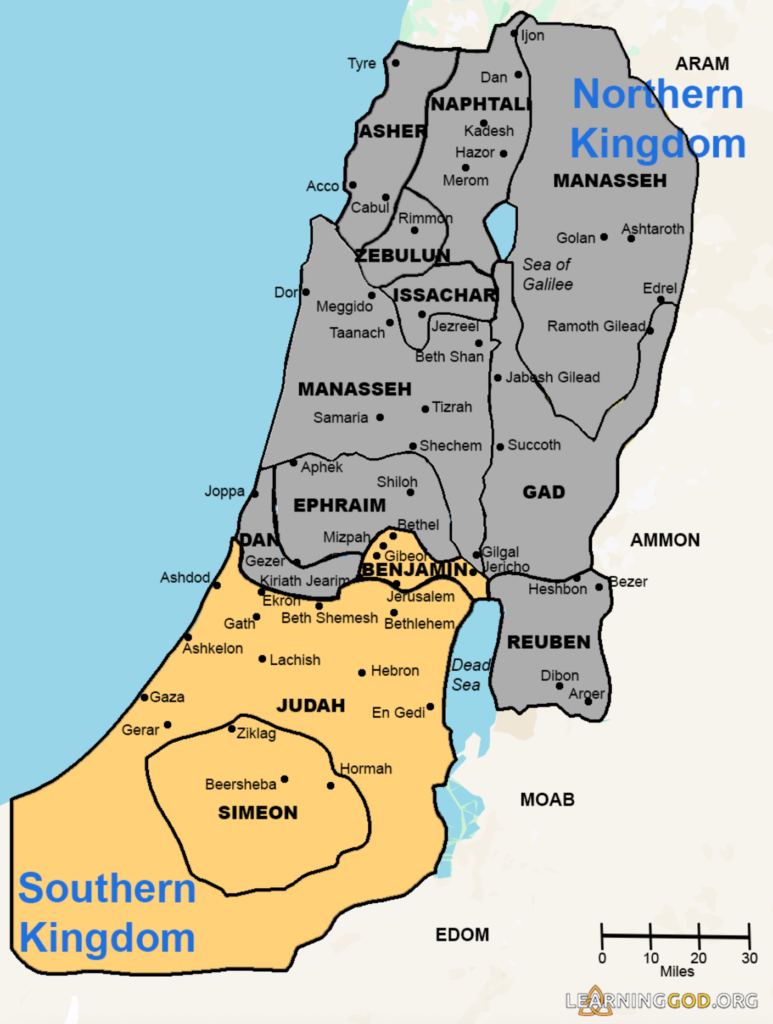Zephaniah
Sin Brings Judgement, God Brings Restoration
Summary | About | Why You Should Read it | Author | When Written | Context | Timeline | Location | Outline | Observations | Resources
Summary
The Book of Zephaniah is one of the twelve minor prophets in the Old Testament. Written by the prophet Zephaniah during the reign of King Josiah of Judah (around 640–609 BC), it is a short but powerful message of impending judgment and ultimate restoration.
Key Themes:
- Judgment on Judah: Zephaniah warns the people of Judah of God’s imminent judgment due to their idolatry, corruption, and moral decline. He focuses particularly on the leaders and priests who have turned away from God.
- The Day of the Lord: This is a central theme of the book, describing a day of divine reckoning, not only for Judah but for all nations. Zephaniah emphasizes that God’s judgment will be universal, impacting all people and nations for their wickedness.
- Judgment on the Nations: After Judah, Zephaniah turns to the surrounding nations, pronouncing judgment on Philistia, Moab, Ammon, Cush (Ethiopia), and Assyria. He declares that these nations, who have opposed or mistreated God’s people, will face destruction.
- Call to Repentance: Despite the grim warnings, Zephaniah offers a call for repentance, urging the people to seek the Lord, righteousness, and humility in hopes of escaping His wrath.
- Promise of Restoration: Zephaniah ends with a hopeful message of future restoration. After the judgment, God will purify the nations, gather a remnant of faithful people, and restore Israel to peace and prosperity. The book closes with a vision of God’s joy over His people, promising salvation and renewal.
Zephaniah is a book that balances a message of severe judgment with the hope of divine mercy and restoration. It warns of the consequences of sin and rebellion while pointing toward the eventual renewal of a faithful remnant and the restoration of God’s people.
The following table provides a high-level look at the structure and contents of the book of Zephaniah.

About
Zephaniah is the 36th book of the Bible and the ninth of the books of the Minor Prophets of the Old Testament.

Why You Should Read It
Reading the Book of Zephaniah can be deeply meaningful for several reasons, both spiritually and practically:
- Awareness of Consequences:
Zephaniah emphasizes the consequences of turning away from God, showing how corruption, idolatry, and moral decline can lead to judgment. It’s a reminder that actions have consequences, and it encourages self-examination of one’s life and faith.
- Hope Amid Judgment:
Despite its stern warnings, Zephaniah ends on a hopeful note, emphasizing God’s mercy and the promise of restoration. It shows that even in the darkest times, God provides a path toward renewal and forgiveness for those who turn back to Him.
- Universal Relevance:
Zephaniah’s themes of justice, righteousness, and humility transcend time and culture. The book’s call for repentance and faithfulness speaks not just to ancient Judah but to all people, challenging us to examine our values and relationship with God.
- The Day of the Lord:
Understanding the concept of “The Day of the Lord,” a day of reckoning for all nations, is important for both biblical studies and theological reflection. It reminds us of God’s sovereignty and justice, pointing to the larger biblical theme of ultimate accountability.
- A Call to Humility and Repentance:
The book urges readers to seek humility and righteousness as a way to avoid judgment. It’s an invitation to prioritize spiritual growth and live with integrity.
- A Vision of God’s Joy:
Zephaniah portrays a unique vision of God rejoicing over His people, singing and delighting in them. This powerful image emphasizes God’s personal love and the joy He finds in those who are faithful, offering comfort and encouragement in times of hardship.
Reading Zephaniah can inspire deeper faith, challenge personal and societal values, and provide hope in the face of life’s difficulties. It’s a short but profound book that covers themes of judgment, repentance, and divine love, making it relevant to both personal spiritual growth and the broader human experience.
Author
The author of the Book of Zephaniah is traditionally identified as the prophet Zephaniah himself. His lineage is given in the opening verse of the book (Zephaniah 1:1), which traces his ancestry back four generations to Hezekiah, leading many to believe that Zephaniah was of royal descent, possibly a descendant of King Hezekiah of Judah. This makes Zephaniah somewhat unique among the prophets, as few others claim such a distinguished heritage.
When Written
Zephaniah was likely written shortly after 609 B.C.
Context
The Book of Zephaniah was written in the context of a turbulent time in the history of Judah, during the reign of King Josiah (640–609 BC). Several important factors and historical events help provide a fuller understanding of the book’s message and urgency:
- Religious and Moral Corruption in Judah:
Before King Josiah’s reforms, Judah had been under the influence of several wicked kings, including King Manasseh and King Amon, who led the nation into idolatry and moral decay. Pagan practices such as the worship of Baal, Molech, and astral deities were widespread. Many people had turned away from worshiping Yahweh, and there was corruption at every level of society, from religious leaders to common citizens. This spiritual and moral decline set the stage for Zephaniah’s harsh prophecies against Judah.
- The Reign of King Josiah:
Zephaniah prophesied early in Josiah’s reign, before the king’s notable religious reforms began. Josiah eventually sought to restore the worship of Yahweh by purging Judah of idolatrous practices and repairing the temple. Zephaniah’s warnings likely influenced, or were aligned with, the reform movement that Josiah would later undertake. The prophet’s message would have been a call to repentance for a nation teetering on the edge of destruction due to its sinful practices.
- The Rise of Assyria and Other Foreign Threats:
At the time, Judah was a small kingdom caught between major powers. Assyria, once a dominant force in the region, was beginning to decline, while Babylon was on the rise. Zephaniah’s warnings of judgment were not only directed at Judah but also at the surrounding nations, such as Philistia, Moab, Ammon, Cush, and Assyria itself. The political instability and threat from foreign powers would have added urgency to his prophecies of an impending “Day of the Lord.”
- Theological Context: The Covenant:
Zephaniah’s message reflects the broader theological framework of the Mosaic Covenant. The people of Judah had a covenant relationship with Yahweh, and their disobedience violated that covenant. Zephaniah’s warnings of judgment align with the covenant curses outlined in Deuteronomy, where turning away from God would lead to disaster. However, the promise of restoration and a remnant points to God’s faithfulness, even when the people are unfaithful.
- The Day of the Lord:
A major focus of Zephaniah’s prophecy is the coming “Day of the Lord,” which in this context refers to a day of divine judgment on Judah and the nations. This was not only a warning of an immediate, temporal judgment (such as conquest by foreign powers like Babylon) but also has eschatological (end-times) significance. The “Day of the Lord” would bring both punishment for the wicked and salvation for the faithful remnant.
- Social and Economic Injustice:
Zephaniah also addresses issues of social injustice, including the corruption of leaders, the oppression of the poor, and the exploitation of others for personal gain. The book suggests that societal breakdown was a key part of why God’s judgment was coming upon Judah.
The Book of Zephaniah was written during a time of spiritual decline, religious corruption, and political instability in Judah. Zephaniah’s message was both a warning and a call for repentance in the face of imminent judgment from God. His prophecies coincided with the early reign of King Josiah, a period marked by the need for religious and moral reform. Zephaniah’s call for repentance and his vision of judgment reflect the broader theological themes of the covenant and God’s ultimate justice, while also pointing to a future hope of restoration for the faithful remnant.
Timeline
The timeline below shows from the beginning of the monarchy with Saul through the start of the Exile. Zephaniah took place from 640 to 609 B.C.
Location
Zephaniah was a prophet to Judah in the Southern Kingdom.
Outline
| I. Introduction (1:1-3) |
| A. Title: The Prophet Identified (1:1) |
| B. Prologue: Double Announcement of Total Judgment (1:2-3) |
| II. The Day of the Lord Coming on Judah and the Nations (1:4-18) |
| A. Judgment on the Idolaters in Judah (1:4-9) |
| B. Wailing throughout Jerusalem (1:10-13) |
| C. The Inescapable Day of the Lord’s Wrath (1:14-18) |
| III. God’s Judgment on the Nations (2:1;3:8) |
| A. Call to Judah to Repent (2:1-3) |
| B. Judgment on Philistia (2:4-7) |
| C. Judgment on Moab and Ammon (2:8-11) |
| D. Judgment on Cush (2:12) |
| E. Judgment on Assyria (2:13-15) |
| F. Judgment on Jerusalem (3:1-5) |
| G. Jerusalem’s Refusal to Repent (3:6-8) |
| IV. Redemption of the Remnant (3:9-20) |
| A. The Nations Purified, the Remnant Restored, Jerusalem Purged (3:9-13) |
| B. Rejoicing in the City (3:14-17) |
| C. The Nation Restored (3:18-20) |
Observations
- Zephaniah was:
- Born during the later part of the reign of King Manasseh.
- The great-great grandson of the godly king Hezekiah
- The only prophet of royal descent.
- Zephaniah was a contemporary of:
- Jeremiah
- Habakkuk
- Zephaniah was indeed an “11th hour” prophet to Judah.
- Josiah:
- Became the King of Judah at age 8
- By age 16 his heart had already begun to turn toward God. n Josiah’s two sets of reform:
- 1st reform occurred during the first year of his reign in 628 B.C.
- Tore down all the altars of Baal.
- Destroyed the foreign incense altars.
- Burned the bones of the false prophets on their altars.
- Broke the carved images and molten images in pieces
- 2nd reform six years later in 622 B.C. having been kindled when Hilkiah the priest found the book of the law in the Temple (2 Chronicles 34:8-35:19).
- Zephaniah pronounces God’s coming judgment upon the nations that surround Judah.
- To the west: Philistia
- To the east: Moab and Ammon
- To the south: Ethiopia
- To the north: Assyria
- Jerusalem is characterized by:
- Spiritual rebellion
- Moral treachery
- The Book of Zephaniah:
- Opens with:
- Idolatry
- Wrath
- Judgment
- Closes with:
- True worship
- Rejoicing
- Blessing
- Opens with:
Old Testament
New Testament
Free Resources
Other Resources
- x


